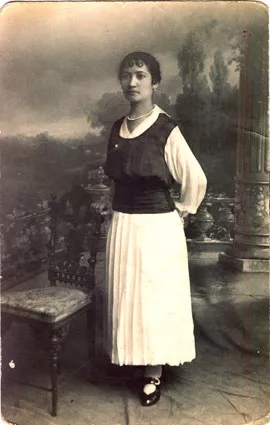Fani Faierstein
This is aunt Fani Faierstein, a sister of my wife's father. My wife says that when her father got married all his sisters were already married and living in their own homes. Her father married in 1922, this is a photograph taken probably in 1920.
My wife's maiden name was Devora Faiestein. She too was born in Iasi, in January 1925. We met for the first time in our Jewish neighborhood, I fell in love with her and to this age, after 56 years of marriage, I'm still in love with her. When I come home and ring the doorbell, and she opens the door for me, it's as if a spotlight lights up the entire house. When I was going to work in the morning and by the time I returned home, I'd start missing her as I didn't see her all day long.
My wife often talks about her parents. Her parents met around 1913, probably in Sculeni [Ed. note: Village in the county of Iasi located on the right riverbank of the river Prut, on the border with the Republic of Moldova, 31 km north-east of Iasi]. Immediately afterwards, the war broke out and her father served on the front for about 6 years. When Bucharest was occupied by the German army, king Ferdinand and the government took refuge in Iasi. My wife's mother was from Sculeni and she went [to Iasi] to visit a neighbor in those days. The neighbor told her: 'Do you want to see the king? Here, pull that small curtain to the side and inside you will see the king.' Her mother was very curious, she pulled the curtain and saw the king. She asked that neighbor if she could ask for something from the king. Her neighbor told her to give it a try, but that she should talk quietly and respectfully. Then she asked the king in a Romanian with a countryside accent because, as she lived in the countryside, she spoke with a peasant's accent, if she could go to the front to see her husband, meaning my wife's father. The king approved of it, and her mother got on the train and left. It seems that they met somewhere on the front, but it was only 6 years later, around 1919-1920, when the peace was signed and her father returned from the front, that they got married.
My wife's family situation wasn't very different [from ours]. They were 5 children, 3 girls and 2 boys. The girls went to school during roughly the same period. Her mother wanted all her girls to be elegant and she woke up at the crack of dawn to iron their school uniforms. The uniforms were washed and the collars were starched, and in order for them not to wear their great coats over the collars, they went to school with the collar placed in a book and they attached it once they arrived at school. The girls wore their hair long, and their mother had to braid it into plaits and iron their bows.
































